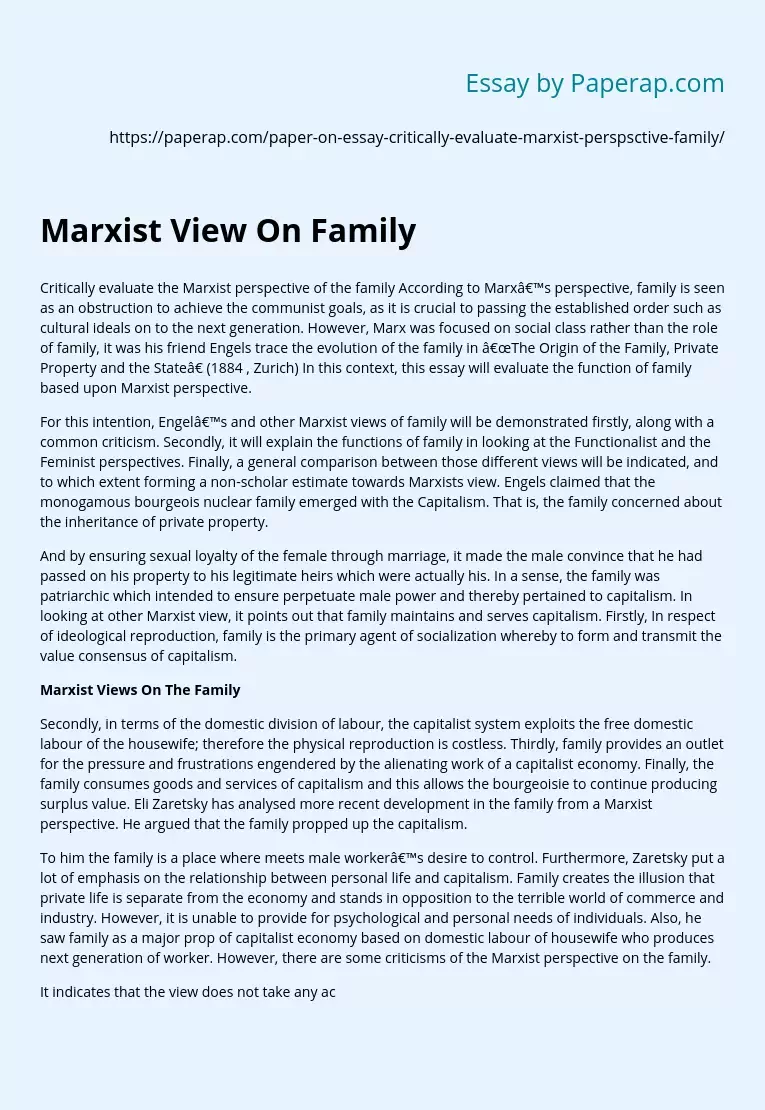Marxist Views On The Family
Critically evaluate the Marxist perspective of the family According to Marx’s perspective, family is seen as an obstruction to achieving the communist goals, as it is crucial to passing the established order such as cultural ideals on to the next generation. However, Marx was focused on social class rather than the role of family, it was his friend Engels traced the evolution of the family in “The Origin of the Family, Private Property and the State” (1884 , Zurich) In this context, this essay will evaluate the function of family-based upon Marxist perspective.
For this intention, Engel’s and other Marxist views of the family will be demonstrated firstly, along with a common criticism. Secondly, it will explain the functions of the family in looking at the Functionalist and the Feminist perspectives. Finally, a general comparison between those different views will be indicated, and to which extent forming a non-scholar estimate towards Marxists view. Engels claimed that the monogamous bourgeois nuclear family emerged with Capitalism.
That is, the family concerned about the inheritance of private property.
And by ensuring sexual loyalty of the female through marriage, it made the male convince that he had passed on his property to his legitimate heirs which were actually his. In a sense, the family was patriarchic which intended to ensure perpetuate male power and thereby pertained to capitalism. In looking at another Marxist view, it points out that the family maintains and serves capitalism. Firstly, In respect of ideological reproduction, the family is the primary agent of socialization whereby to form and transmit the value consensus of capitalism.
Secondly, in terms of the domestic division of labor, the capitalist system exploits the free domestic labor of the housewife; therefore the physical reproduction is costless. Thirdly, the family provides an outlet for the pressure and frustrations engendered by the alienating work of a capitalist economy. Finally, the family consumes goods and services of capitalism and this allows the bourgeoisie to continue producing surplus value. Eli Zaretsky has analyzed more recent development in the family from a Marxist perspective. He argued that the family propped up capitalism.
To him, a family is a place where meets male workers’ desire to control. Furthermore, Zaretsky put a lot of emphasis on the relationship between personal life and capitalism. Family creates the illusion that private life is separate from the economy and stands in opposition to the terrible world of commerce and industry. However, it is unable to provide for the psychological and personal needs of individuals. Also, he saw the family as a major prop of a capitalist economy based on the domestic labor of housewives who produces the next generation of workers. However, there are some criticisms of the Marxist perspective on the family.
It indicates that the view does not take any account of the oppression of women in families, and to which extent it shows absolutely negative about the family and does not give any of the positive benefits of the family to family members. Marxist feminists nevertheless put emphasis on the exploitation of women which supply the gap. The fact that the husband has the responsibility for the production payments and family support acts as a discipline on his behavior at work. And it keeps him in good running order in which the wife is encouraged to satisfy her husband’s needs.
In some sense, a family is an authoritarian unit designed to teach passivity not resistance. It inevitably results in the oppression of women in families which is virtually inequitable. Next, the perspectives from Functionalist and Feminist on the family will be examined in generalities and whereby links to a holistic evaluation on Marxist perspective. In the functionalist view, Murdock argues that the family plays four fundamental functions in terms of sexuality, reproduction, economy and education. These functions are inseparable, that is, it serves both nuclear family members at the same time and in the same way.
Take sexual function, for instance, husband and wife both have the right to access to each other and there are rules forbidding adultery. Murdock claims his analysis provides the family’s multilateral utility and thus of its inevitability. However, Murdock does not consider whether its functions could be performed by other social institutions and without examining alternatives to the family. In addition, in fact, it is hard for family to achieve that harmony and integration. Furthermore, In Parson’s view, the family has two core functions which refer to primary socialization and personality stabilization.
On contrary, feminists are highly critical of the family and thus lead to stress on the harmful effects of family life upon women. They have challenged the view of the inevitability of male dominance in families. And they also claimed that women have contributed to the social economy by their domestic work within the family which was opposite to Marxist. Furthermore, they criticized the cooperative image of family life like sharing interests and love and indicated that actually, the men obtained greater benefits from families.
To be concluded, Marxists and functionalists share the idea that the functions of the family maintain the capitalist society. The distinction is that Marxists see it as unfair and exploitative while Functionalists see it as harmonious and integrated. On the other hand, Marxists and feminists both argue that family is not that positive as functionalists think. The differences between them are probably due to the different areas they concentrate on, as Marxists are more likely to link family with capitalism while the Feminists emphasize on the women’s situation. Word count :914 Jingzhi Wang (Amy) Group I
Marxist Views On The Family. (2019, Dec 05). Retrieved from https://paperap.com/paper-on-essay-critically-evaluate-marxist-perspsctive-family/

